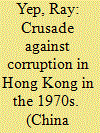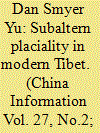|
|
|
Sort Order |
|
|
|
Items / Page
|
|
|
|
|
|
|
| Srl | Item |
| 1 |
ID:
122636


|
|
|
|
|
| Publication |
2013.
|
| Summary/Abstract |
This article aims to critically review the recent phenomenon of eco-cities in China which has captured the attention of the city authorities since the 2000s. At the time of writing, more than 200 eco-city projects have been proposed, are under construction, or have even been partly or fully implemented. Many of these eco-cities are not retro-fitted development plans in the downtown areas but are new large-scale land development projects on the outskirts of municipalities. The impetus behind the current Chinese 'new-town-style' eco-cities can be viewed as the third round of post-Mao land development isomorphism. The first - development zones - took place in the 1980s, and the second - college towns - started from the late 1990s. In the post-Mao context, Chinese local entrepreneurialism, which is characterized by (1) inter-scalar strategies to formally and informally pursue projects and (2) novel discourses that seek to legitimize projects, is actually motivated by land finance. Therefore, Chinese eco-cities driven by land-speculation-oriented local entrepreneurialism are very likely to be yet another manifestation of spatial development fervour, which contributes to further local extra-budgetary revenue and generates social conflict as opposed to sustainable development.
|
|
|
|
|
|
|
|
|
|
|
|
|
|
|
|
| 2 |
ID:
122637


|
|
|
|
|
| Publication |
2013.
|
| Summary/Abstract |
The creation of the Independent Commission Against Corruption (ICAC) in February 1974 was arguably one of the most important developments in Hong Kong since 1945. Not only did major corruption syndicates disappear from the fabric of public administration in the colony, but the popular acceptance of bribery as a component of social life also faded away. Sir Murray MacLehose, who served as Governor of Hong Kong between 1971 and 1982, was regarded by locals as the maverick behind this miracle. This article argues, however, that the genesis of the ICAC could be better understood as a product of the cumulative efforts of MacLehose and his predecessors. The initiative should also be considered in the political context of the rising tension between London and the local community. In a way, the establishment of the ICAC helped pre-empt London's intervention in this matter. Also, despite a public appearance of unbridled support for the crusade against corruption, MacLehose's resolve was severely tested during the early years of the ICAC, and he did contemplate moderating the operation of the Commission, even before the partial amnesty in 1977.
|
|
|
|
|
|
|
|
|
|
|
|
|
|
|
|
| 3 |
ID:
122635


|
|
|
|
|
| Publication |
2013.
|
| Summary/Abstract |
I attempt to write this article as a pathology of modernity in connection with how place, memory, and subalternity are expressed by urban Tibetans in China. The literary works of Shogdong, a contemporary Tibetan writer and cultural critic, are the focus of my interpretation of the sociopolitical, religious, and psychological meanings of an anti-traditional discourse among urban Tibetans. My pathologizing this intra-Tibetan discourse is meant to discern how modern subjectivity or its mindscape in the case of urban Tibetans is inherently conditioned by place as both geographic landscape and locus of memory. I then argue that the negation of anti-traditional Tibetans of their native traditional cultural and religious values and practices is a remembering process which is inversed as a process of seemingly intentional subversion, rejection, and forgetting; and I further argue that the anti-traditionalist imagining of a modern Tibet, though it uses nomenclature identical to that of China's socialism, is not a replica of China's modernity, but an exercise of a power discourse in a subaltern sense.
|
|
|
|
|
|
|
|
|
|
|
|
|
|
|
|
|
|
|
|
|